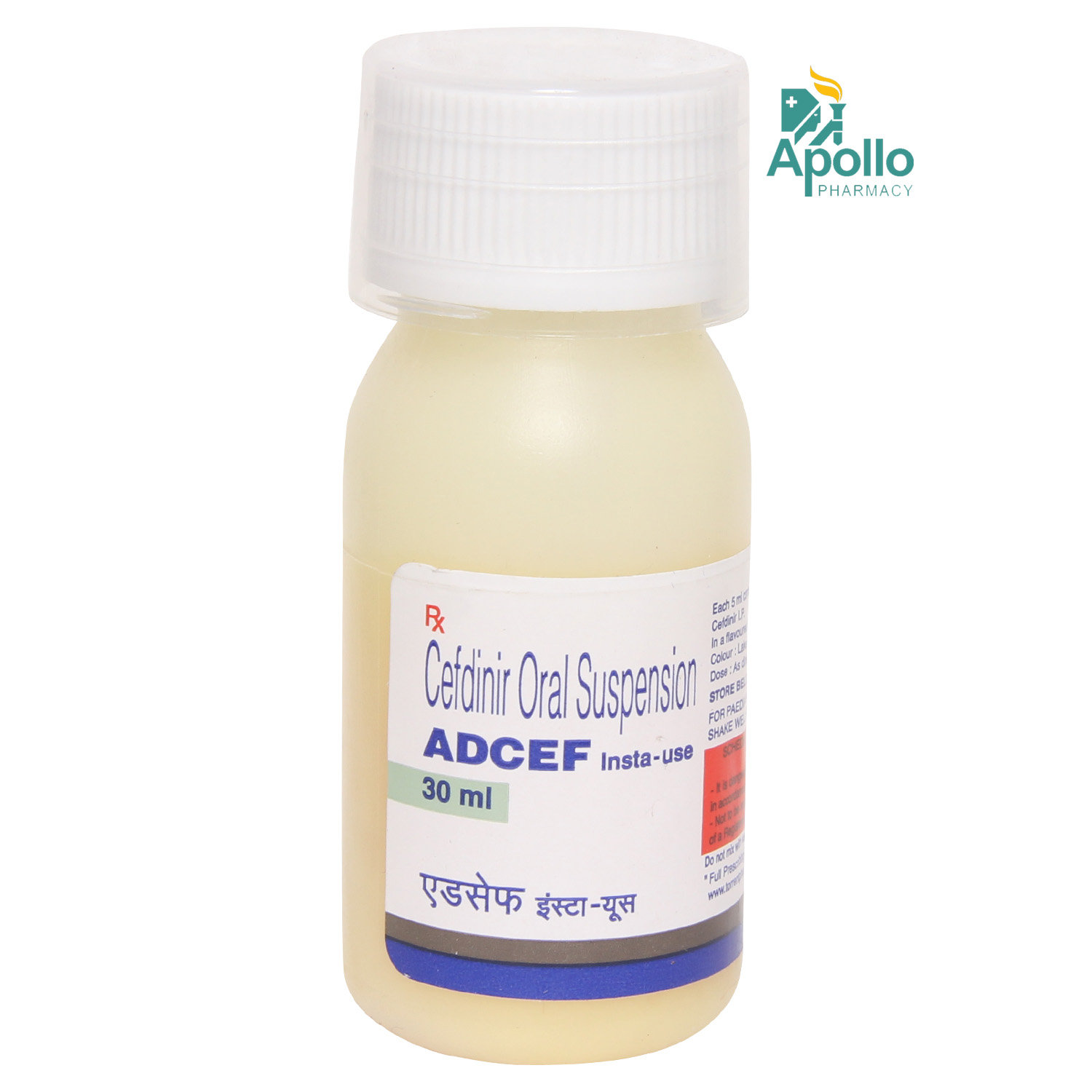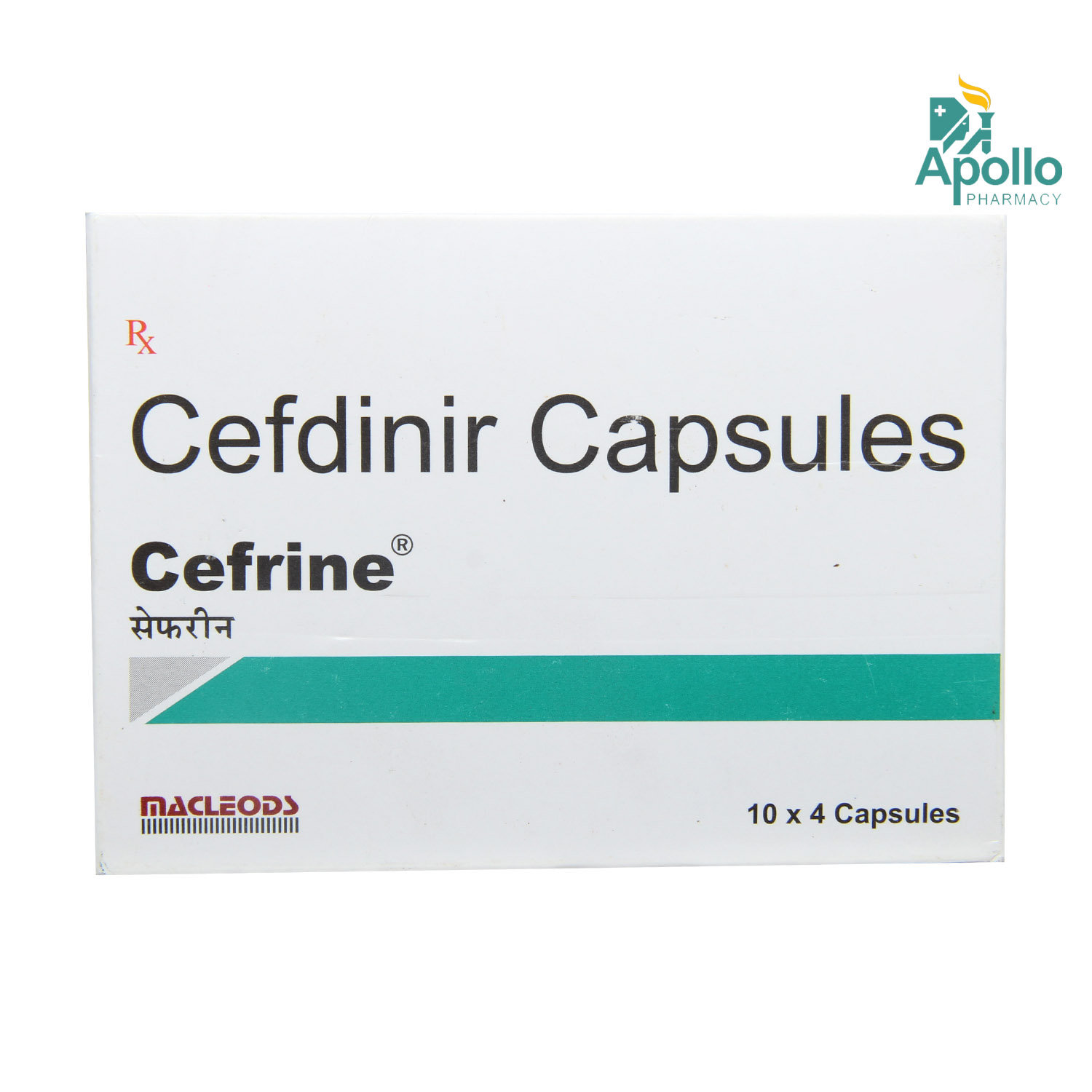Cefdinir
About Cefdinir
Cefdinir belongs to a class of medication called 'antibiotics' used to treat several bacterial infections of the urinary tract, bones and joints, heart, lungs, brain, chest, ears, skin or soft tissues. Bacterial infection is when harmful bacteria grow in the body and cause infection. It can infect any part of the body and multiply very quickly. Cefdinir does not work against infections caused by a virus such as flu or a common cold.
Cefdinir contains Cefdinir, a cephalosporin antibiotic that works by interfering with the formation of the bacterial cell wall (a protective covering) necessary for their survival. This damages the bacterial cell wall and kills bacteria.
Take Cefdinir as prescribed by your doctor. You are advised to take Cefdinir for as long as your doctor has prescribed it for you based on your medical condition. In some cases, you may experience diarrhoea, nausea, stomach pain, vomiting, rash, headache or vaginal itching or discharge. Most of these side effects of Cefdinir do not require medical attention and gradually resolve over time. However, if the side effects persist or worsen, please consult your doctor.
Please tell your doctor if you are allergic to Cefdinir, cephalosporin antibiotics or any other medicines, please tell your doctor. If you are pregnant or breastfeeding, inform your doctor before taking Cefdinir. Cefdinir is not recommended for babies below six months of age as the safety and effectiveness were not established. Drive only if alert, as the Cefdinir may cause dizziness. You are advised to maintain a time gap of a minimum of 2 hours between taking Cefdinir and antacids containing aluminium, magnesium, iron supplements and multivitamins containing iron. These may reduce the body's absorption of Cefdinir by the body.
Uses of Cefdinir
Medicinal Benefits
Cefdinir contains Cefdinir, a cephalosporin antibiotic used to treat several bacterial infections. Cefdinir is a broad-spectrum antibiotic that acts against aerobic (grow in the presence of oxygen) and anaerobic (grow in the absence of oxygen) gram-negative and gram-positive bacteria. It interferes with the formation of the bacterial cell wall (a protective covering) that is necessary for their survival. Thereby damaging the bacterial cell wall and killing bacteria.
Directions for Use
- Take Cefdinir with or without food as advised by your doctor.
- It is advised to take Cefdinir 1 to 2 times daily; however, follow your doctor’s recommendation regarding the dosage and duration.
- Swallow Cefdinir as a whole with a glass of water.
- Do not crush, chew, or break it.
Storage
Side Effects of Cefdinir
- Diarrhoea
- Nausea
- Stomach pain
- Vomiting
- Rash
- Headache
- Vaginal itching or discharge
Drug Warnings
Please tell your doctor if you are allergic to Cefdinir, cephalosporin antibiotics, or other medicines. If you have kidney problems or inflammation of the large intestine, inform your doctor before taking Cefdinir. If you are pregnant or breastfeeding, consult a doctor before taking Cefdinir. Cefdinir is not recommended for babies below six months of age as the safety and effectiveness were not established. Drive only if alert, as the Cefdinir may cause dizziness. You are recommended to complete the entire course of Cefdinir as your doctor prescribes for effective results. Cefdinir may interact with specific tests such as glucose (sugar) in urine and Coomb's test, giving false-positive results. Therefore, inform your doctor that you are taking Cefdinir before undergoing any tests. You are advised to maintain a time gap of a minimum of 2 hours between taking Cefdinir and antacids containing aluminium, magnesium, iron supplements and multivitamins containing iron. These may reduce the body's absorption of Cefdinir by the body.
Drug Interactions
Drug-Drug Interaction: Cefdinir may interact with drugs used to lower high uric acid levels (probenecid).
Drug-Food Interaction: Cefdinir should be taken 2 hours before or after taking foods containing iron or antacids containing magnesium or aluminium, which may affect Cefdinir effectiveness.
Drug-Disease Interaction: If you have kidney problems or inflammation of the large intestine, inform your doctor before taking Cefdinir.
Drug-Drug Interactions Checker List:
Safety Advice

Alcohol
cautionThe interaction of Cefdinir with alcohol is unknown. Please consult a doctor before consuming alcohol while using Cefdinir.

Pregnancy
cautionCefdinir is a category B pregnancy drug and is given to pregnant women only if the doctor thinks the benefits outweigh the risks. Please consult a doctor if you are pregnant or planning for pregnancy.

Breast Feeding
cautionIt is unknown whether Cefdinir is excreted in human milk. Cefdinir is given to breastfeeding mothers if the doctor thinks the benefits outweigh the risks. Please consult a doctor if you are breastfeeding.

Driving
cautionCefdinir may cause dizziness in some people. Therefore, avoid driving if you feel dizzy after taking Cefdinir.

Liver
safe if prescribedIf you have any concerns regarding the use of Cefdinir in patients with liver problems, please consult a doctor.

Kidney
cautionTake Cefdinir with caution, especially if you have a history of Kidney diseases or conditions. Your doctor may adjust the dose as needed.

Children
cautionCefdinir is not recommended for babies under 6 months of age as the safety and effectiveness have not been established.
Habit Forming
Diet & Lifestyle Advise
- Take probiotics after completing the entire course of Cefdinir to restore some healthy bacteria in the intestines that may have been killed. Taking probiotics after antibiotic treatment can reduce the risk of antibiotic-associated diarrhoea.
- Certain fermented foods like cheese, yoghurt, kombucha, sauerkraut, and kimchi can help to restore the good bacteria of the intestine.
- Include fibre-rich foods, which can be easily digested by your gut bacteria and help stimulate their growth. Thus, fibre-rich foods may help restore healthy gut bacteria after a course of antibiotics. Whole grains such as brown rice and whole-grain bread should be included in your diet.
- Make sure you drink plenty of water or other fluids every day while you are taking Cefdinir.
- Avoid alcohol consumption as it may increase adverse effects.
Special Advise
- If you are about to undergo any blood or urine tests, inform your doctor that you are taking Cefdinir as it may interfere with the urine test (for sugar) and Coomb’s test (for blood test).
Patients Concern
Disease/Condition Glossary
Bacterial infection: It is a condition in which harmful bacteria grow in the body and cause infections. It can target any part of the body and multiply very quickly. Bacteria come in three basic shapes, namely spherical, rod or spiral-shaped. Bacteria may be gram-positive (have thick cell walls) or gram-negative (do not have cell walls). Appropriate tests are done to identify bacterial strains, and based on the results, proper medication is prescribed. Some common symptoms of bacterial infection include cough, fever and tiredness.
FAQs
Cefdinir is used to treat bacterial infections of the urinary tract, bones and joints, heart, lungs, brain, chest, ears, skin or soft tissues.
Cefdinir contains Cefdinir, an antibiotic that works by interfering with the formation of the bacterial cell wall (a protective covering), which is necessary for their survival. This damages the bacterial cell wall and kills bacteria.
It is not recommended to take Cefdinir with probenecid (used to lower high uric acid levels) as it may increase the levels of Cefdinir in the blood and increase the risk of adverse effects such as diarrhoea, kidney problems, vomiting, and nausea. However, please consult your doctor before taking Cefdinir with other medicines.
Cefdinir may cause diarrhoea as a common side effect. However, if the condition persists, worsens or if you notice blood or mucus in stools, avoid taking Cefdinir and consult a doctor immediately.
Cefdinir may interfere with the urine test (for sugar) and the Coombs test (for blood test), giving false-positive results. Therefore, if you are about to undergo any laboratory tests, inform your doctor or lab technician that you are taking Cefdinir.
Cefdinir is not used to treat viral infections; it is an antibiotic used only to treat bacterial infections.
You are advised to maintain a time gap of at least 2 hours between taking Cefdinir and antacids containing aluminium and magnesium, as these may reduce the body's absorption of Cefdinir. However, please consult a doctor before taking other medicines with Cefdinir.
Cefdinir can be used for a sore throat if it's caused by a bacterial infection like strep throat. It won't help if the sore throat is due to a virus, like a cold or the flu.
Do not stop taking Cefdinir just because you feel better. Complete the full course of treatment as directed by your doctor to ensure the infection is fully treated and prevent antibiotic resistance. Stopping early may make the infection harder to treat. Inform your doctor about your improved condition, and they will assess and advise whether to continue or discontinue the medication, prioritizing your safety.
Cefdinir is generally considered safe when used as prescribed by a doctor. However, like all medications, it can have side effects and potential interactions with other drugs. It's important to follow your doctor's instructions and inform them of any pre-existing and existing medical conditions or medication history to avoid negative complications.
Cefdinir interacts with magnesium in food products, and it's better to take it 2 hours before or after having milk, as milk contains magnesium.
If you forget a dose of Cefdinir, take it immediately when you remember. However, if your next dose is near, skip the missed dose and continue with your regular schedule. Never double dose to make up for a missed dose, as this may increase side effects.
To ensure the optimal effect of Cefdinir without side effects, avoid drugs that reduce stomach acid, foods containing iron, or antacids with magnesium or aluminium as they may have potential interaction with the drug. Also, avoid alcohol as it may increase dizziness, and abstain from driving if you feel dizzy after taking Cefdinir. If you have any concerns, please discuss them with your doctor.
Cefdinir typically starts working within a few hours after ingestion. Still, noticeable symptom improvements may take a few days and vary from person to person depending on the dose, severity of the condition, and absorption rate. Completing the full course as prescribed is essential to achieve maximum benefits.
If you don't feel better after taking Cefdinir, it's important to contact your doctor. Your symptoms might require a different dose or treatment, or there could be another underlying issue. Your doctor will examine your situation and provide the appropriate treatment. Don't stop the medication without consulting your healthcare provider first.
The common side effects of Cefdinir are diarrhoea, nausea, stomach pain, vomiting, rash, headache, vaginal itching or discharge. However, these symptoms vanish as your body adjusts to the medication. If these symptoms become worse, please consult a doctor for relief.
Store Cefdinir at room temperature, away from moisture and heat. Keep it out of the reach of children and pets.







